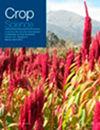Inheritance of summer patch disease tolerance in hard fescue (Festuca brevipila Tracey)
IF 2
3区 农林科学
Q2 AGRONOMY
引用次数: 0
Abstract
Hard fescue (硬羊茅(Festuca brevipila Tracey)耐夏斑病的遗传性
硬羊茅(Festuca brevipila Tracey)是一种冷季型草坪,以在低维护条件下表现优异而著称。不过,它很容易感染夏斑病。夏斑病是由 Magnaporthiopsis poae 和 Magnaporthiopsis meyeri-festucae 引起的一种根部疾病。本研究的目的是调查硬羊茅受控杂交种耐夏斑病的遗传性。实验种群是通过将三个耐夏亲本和三个易感亲本杂交而成的全同父异母家族。在 2017 年(试验 1)和 2019 年(试验 2)的刈割间隔种植试验中,分别建立了 15 个杂交后代和互交后代中的 100 个后代。所有后代和选定的亲本基因型均采用随机完全区组设计,四次重复,并接种了M. meyeri-festucae分离株(SCR9)和M. poae分离株(C11)的混合物。在 2018 年、2019 年、2020 年和 2021 年夏季,通过目测评估硬羊茅基因型的病害严重程度。后代对疾病反应的差异表明,遗传是由几个主要基因控制的。后代表型与亲本表型相关。狭义遗传率估计值为 0.20(± 0.01),广义遗传率估计值为 0.67(± 0.08)。遗传力估计值不高,但表明通过选择和育种有可能提高夏斑耐受性。这是首次报告任何草坪物种对夏斑耐受性的遗传力估计值。这项研究将有助于确定硬羊茅耐夏斑最有效的选择程序。
本文章由计算机程序翻译,如有差异,请以英文原文为准。
求助全文
约1分钟内获得全文
求助全文
来源期刊

Crop Science
农林科学-农艺学
CiteScore
4.50
自引率
8.70%
发文量
197
审稿时长
3 months
期刊介绍:
Articles in Crop Science are of interest to researchers, policy makers, educators, and practitioners. The scope of articles in Crop Science includes crop breeding and genetics; crop physiology and metabolism; crop ecology, production, and management; seed physiology, production, and technology; turfgrass science; forage and grazing land ecology and management; genomics, molecular genetics, and biotechnology; germplasm collections and their use; and biomedical, health beneficial, and nutritionally enhanced plants. Crop Science publishes thematic collections of articles across its scope and includes topical Review and Interpretation, and Perspectives articles.
 求助内容:
求助内容: 应助结果提醒方式:
应助结果提醒方式:


